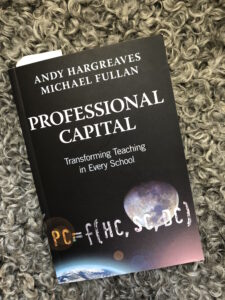 Professional capital – Transforming teaching in every school.
Professional capital – Transforming teaching in every school.
A book by Alan Hargreaves and Michael Fullan.
“In the end, nobody can give you professional capital. It’s an investment. […] Nobody’s going to be prepared to invest in anyone unless they are willing to invest in themselves. This is by far the best place, and indeed the first place, to begin.”
I remember a coachwalk I had with a client, who got a massive insight into exactly this: how he had mistakenly believed that it was the sole responsibility of his employer to invest in him, rather than something he also had responsibility for. By (also) investing in himself, he would be increasing his own human and professional capital, serving both himself as well as his current, and future, employers.
“Working with big ballroom audiences, or conducting training workshops outside of school or using one-to-one coaching to enforce compliance with imposed programs, has little deep or long-standing impact on teachers’ daily practice.
What is crucial is what happens between workshops. Who tries things out? Who supports you? Who gives you feedback? Who picks you up when you make a mistake the first time? Who else can you learn from? How can you take responsibility for change together? The key variable that determines success in any innovation, in other words, is the degree of social capital in the culture of your own school Learning is the work, and social capital is the fuel. If social capital is weak, everything else is destined for failure.”
As I have been working with Pernilla Tillander with all pre-school as well as all school-staff in the commune of Skurup in the south of Sweden during 2017-2018, I am totally onboard here. We have done four half-day workshops with all staff (in groups of maximum 70 people), spread out over two semesters, with process leaders following up b e t w e e n the modules – and those follow-up sessions have been absolutely critical for the success of the personal group development we were hired to provide! Because the truth is this: we can provide an opportunity for personal group development through leadership training. But we, me and Pernilla, are not the ones who makes it happen for real, that is up to the participants. We do our bit of the work, of course, but the rest is up to the participants. They have to do the work: “The best place to begin is always with yourself. Your own experiences, frustrations, ideals, and sense of self are the crucial starting points.”
Now, this is a book with a lot of good stuff. It’s well laid out and presented, and ends with clear and concise suggestions for developing roadmaps ahead, on three levels, for teachers; for school and district administrators; and for state, government and union/federation leaders. And I definitely think there’s a lot of value to be had, in making the suggested changes to ensure a growing and continuously evolving professional capital. (And honestly, they do target teaching and education, but there’s plenty of value for any person, organization or workplace interested in culture and development through learning better, more and continuously.)
Hargreaves and Fullan push all the way to the edges of the box I call the school system. But boy would I like to see them push beyond those edges! Now that would be something extraordinary, that’s for sure. Because although they are great at prodding sore spots, identifying areas that must be transformed…. they are still locked within the paradigm of schools, in the way schools are, and have been, since they were first created. They do make a pass at the unit of the lesson but fail to take their own advice, never fully making a pass at the unit of schools.
“The unit of the lesson that Hattie adopts as the standard currency of teaching and schooling is more than a century old. Yet, lessons have never been the only unit of teaching and they will likely become less and less the unit of teaching in the future. […] If we are saying that it is outdated to base teachers’ contracts on class sizes, using the class as the unit of calculation, then we have to acknowledge that among administrators and researchers, the lesson may be and should be becoming equally outdated as the unit of teaching and learning too.”
Don’t you agree with me that it would be very interesting to see them take this critical viewpoint up a notch or two, encompassing the entire system of schooling and education?
The book I am blogging about is part of the book-reading challenge I’ve set for myself during 2019, to read and blog about 12 Swedish and 12 English books, one every other week, books that I already own.